Opera Holland Park has a tradition of bringing little-known verismo operas into the light and making them shine. In recent years, the company has excelled with stagings of Mascagni’s Iris (2016), Isabeau (2018) and L’Amico Fritz (2021), Leoncavallo’s Zazà (2017) and Cilea’s L’arlesiana (2019). This season, OHP are presenting a double bill that sparks interest because it isn’t ‘Cav & Pag’, but which doesn’t skimp on verismo passion and punch.
Delius and Puccini might not seem obvious bedfellows but the former’s Margot la Rouge and Puccini’s first opera, Le Villi, are both tales of betrayal and separation, surprise reunions and vengeance either from the grave or propelling the protagonists in that direction. Moreover, both operas also have a vivid heroine at their core, and having previously embodied the aforementioned Iris, Isabeau and Zazà, the French soprano Anne Sophie Duprels is a welcome returnee to Holland Park as the flame-haired Margot whose passions leave both of her lovers dead, and Puccini’s Anna who, abandoned by her lover, executes a supernatural revenge on the remorseful Roberto.
Coincidentally, Margot la Rouge and Le Villi are also linked by the series of competitions that the Milanese publisher Edoardo Sonzogno sponsored for budding opera composers in the late nineteenth and early twentieth centuries. In 1883, Puccini had no luck with Le Villi (though a private performance attracted the attention of Sonzogno’s rival Giulio Ricordi, doing Puccini’s career no harm at all. The third Sonzogno competition in 1902, inviting entries of one-act operas from composers who had not previously had a work staged, caught the attention of Delius, none of whose four operas had at that point made it into the theatre, and who was permitted to enter because of a change in the rule which widened the previously exclusively Italian field to include international composers.
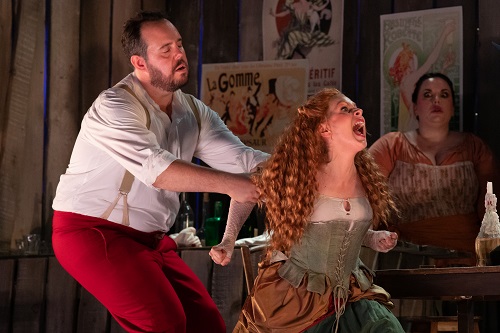
Delius commissioned his younger friend Maurice Ravel to produce a vocal score of the opera, and though this failed to impress the competition judges, he later had it privately published. The opera wasn’t staged until 1983, however, when it was mounted by the Opera Theatre of St Louis. But, in the 1930s, working with his amanuensis Eric Fenby, Delius, then blind and paralysed, salvaged parts of the score in an Idyll for soprano, baritone and orchestra setting text from Whitman’s Leaves of Grass.
If Sonzogno was hoping to inspire something other than the Italian-style verismo that had dominated the field since Mascagni’s Cavalleria rusticana had taken the prize in 1890, then he’d have been disappointed by Delius’s 45-minute Margot la Rouge. The libretto by Berthe Gaston-Danville (aka ‘Rosenval’) serves up plentiful sensation and violence. The setting is a run-down bar in the outer suburban streets of Paris – perhaps similar to those frequently by Delius himself during his bohemian years in Paris, during which he contracted syphilis. The characters are prostitutes, pickpockets and pimps. Jealousy, brutality and exploitation are the names of the game.
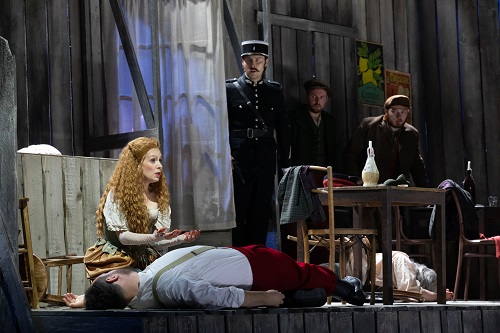
The libretto supplies the required dash of grand guignol: the vicious jealousy of Lili Béguin whose love for L’Artiste, Margot’s ‘protector’, fuels the tragedy; the torrential downpour that forces the prostitutes from the streets and a group of soldiers into the café; a knife-fight between Margot’s former sweetheart, the sergeant Thibault and L’Artiste, after the latter assaults Margot; and, a double-murder culminating in Margot’s ironic cry, “La Rouge? Vous voyez bien que c’est moi!”, as she holds up her blood-stained hands.
It’s not immediately clear why Delius, better known for languid instrumental poetry evoking summer gardens, paradise walks and the first cuckoos of spring, would have been attracted to Gaston-Danville’s seedy melodrama – not least because the characterisation is superficial and undeveloped. L’Artiste, who doesn’t enter until three-quarters of the way through the opera, is a stock ‘baddie’ who isn’t even accorded a name. Margot herself enters in scene three but doesn’t sing for ten minutes. There are several ‘gaps’, not least why the seventeen-year-old Marguerite disappeared from her small village five years earlier and ended up in a Paris brothel.
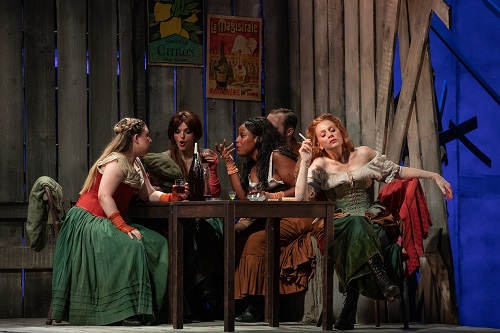
Delius indulges in a few verismo tropes – some tremolo strings and extreme dynamic contrasts, in scenes such as the storm and the fight – and the durchkomponiert score paces the action effectively, but there’s no ‘big tune’ and he’s at his best in the lyrical rather than the sensational episodes – as in the orchestral prelude, sensitively played here by the City of London Sinfonia under conductor Francesco Cilluffo, and the impassioned ten-minuet duet for Margot and Thibault as they plan to return to their village, ‘far from evil desires and wicked people’.
The director Martin Lloyd-Evans and the designer takis play it straight. A revolving wooden shack – described by one of the soldiers as ‘un bouge’, slang for hovel or dive – centre-stage is shabbily festooned with posters and furnished with a few chairs and tables. (Later it will become Anna’s home and garden.) There’s a bustling but focused atmosphere – not much use is made of the extending fore-stage, though that comes into its own in Le Villi – as the large cast, many of whom make small solo contributions, establish the sleazy ambience. Anne Sophie Duprels sings with intensity but also communicates the enigmatic quality that separates Margot from her fellow filles de joie.
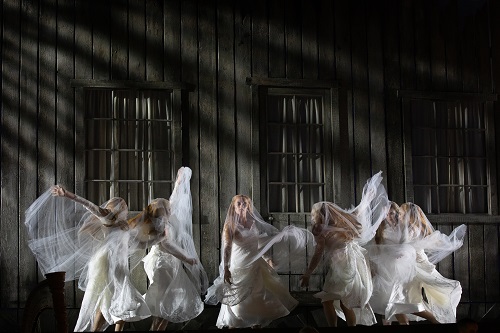
Tenor Samuel Sakker sings with vigour as Thibault, but taps Delius’s lyrical vein when he reminisces about the pure Marguérite whose vision he has held in his ‘bewitched’ heart, the divided low strings deepening the emotive impact. Bass-baritone Paul Carey Jones conveys L’Artiste’s pitiless brutishness, and while Sarah Minns doesn’t have much music with which to establish Lili’s obsession with the callous pimp, she exploits it effectively. The orchestra, rather than the voices, carry the weight of the storytelling, and Cilluffo energetically whips up the City of London Sinfonia, though they sometimes overpower the voices in the big moments. But, the big duet makes its mark, blossoming with sumptuous sensuousness.
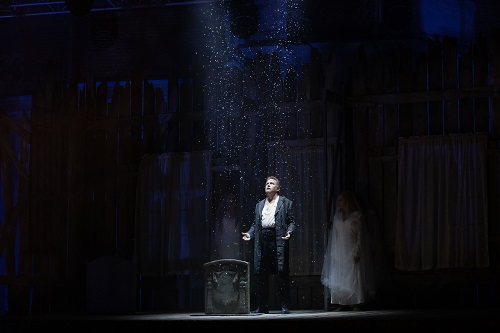
If Puccini is much more likely than Delius to be associated with bohemians and courtesans in Parisian hovels, in Le Villi he offers not a slice of real life but a hefty slab of gothic German Romanticism. Ferdinando Fontana’s libretto sets the action in the Black Forest where the villagers are celebrating the betrothal of Roberto to Anna, daughter of Guglielmo. Before the marriage, though, Roberto must leave for Mainz to collect an inheritance bequeathed him by an old woman, and Anna is troubled by premonitions that she will die before his return. Duly, in Mainz Roberto does indeed fall for a femme fatale; Anna, forgotten, despairing, dies of a broken heart and is transformed into a Willi – the ghostly spirit of woman who has died after being deserted. When it’s Robert’s turn to be abandoned by his new love, he returns penniless to the village, and is greeted not as he expects by a jubilant Anna, but by a group of Willis including Anna. Denouncing his faithlessness, she curses him and drags him in the witches frenzied dance until, exhausted, he falls dead.
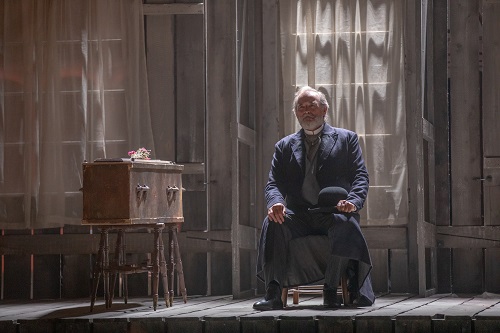
Puccini’s characters are no less one-dimensional than those in Margot la Rouge, but his music has a stronger identity. At first, Duprels’ conveys Anna’s purity and vulnerability, even when singing with radiant luxuriousness, as in the Act 1 aria in which she envies the flowers the untroubled certainty of their existence, but she skilfully develops a musical portrait of terrific dramatic power, culminating in a stunning final duet with Roberto. As the disloyal lover, tenor Peter Auty conveys every drop of melancholy and heartache in Roberto’s long ‘Scena Drammatic-Romanza’, in which he recalls with anguish the happy days that he has betrayed. It’s a heady emotive peak. Baritone Stephen Gadd’s stern Guglielmo has a Verdian stature and Gadd delivers the recitation – which tells of the death of Anna and the storm through which Robert battles his way home – with clarion diction too.
Lloyd-Evans doesn’t eschew gothic kitsch and Jake Wiltshire lights the witches’ wild sabbath dance and graveyard hauntings with garish glee, though the choreography (Jami Reid-Quarrell) – as the Willis waltz with empty black suits, or swirl their white veils in streaming circles – is at times a tad cartoonish.
Both operas follow persuasive trajectories, though, and once again Opera Holland Park show that melodrama might be histrionic, but it can be moving too.
Claire Seymour
Margot la Rouge: Margot – Anne Sophie Duprels, Sergeant Thibault – Samuel Sakker, L’Artiste – Paul Carey Jones, Lili Béguin – Sarah Minns, Laura Lolita Perešivana – Nini, La Patronne – Laura Woods, First Soldier –George von Bergen, La Poigne – Jack Holton, Second Soldier – Alistair Sutherland, Totor – David Woloszko, First Woman – Grace Nyandoro, Second Woman – Alys Roberts, Third Woman – Chloë Pardoe, First Drinker – Sean Webster, Matthew Duncan – Second Drinker, Peter Lidbetter – Third Drinker/A Man, Waiter – Richard Moore, Police Inspector – Dragoş Andrei Ionel
Le Villi: Anna – Anne Sophie Duprels, Roberto – Peter Auty, Guglielmo – Stephen Gadd, Dancer – Fern Grimbley, Isabel Le Cras, Gabriella Schmidt
Director – Martin Lloyd-Evans, Conductor – Francesco Cilluffo, Designer – takis, Lighting Designer – Jake Wiltshire, Movement Director – Jami Reid-Quarrell, Opera Holland Park Chorus (Chorus Master, Dominic Ellis-Peckham), City of London Sinfonia
Opera Holland Park, Kensington, London; Thursday 21st July 2022.
ABOVE: Anne Sophie Duprels as Anna and Peter Auty as Roberto © Ali Wright